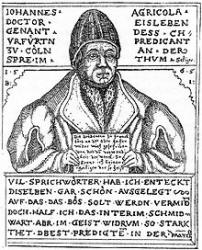
1494 - 1566 Person Name: Johann Agricola Author of "To thee, O Lord, I send my cries" Agricola, Johann or Johannes (latinized from Schneider, (Schnitter) or Sartor, also called Magister Islebius), born April 20, 1492, at Eisleben, where his father was a tailor. During his University course at Wittenberg, Luther took a great interest in him, entertained him at his own table, took him with him to Leipzig for the disputation, in 1519, with Dr. Eck, and in 1525 procured for him the position of Rector of St. Andrew's School at Eisleben, and preacher at St. Nicholas's Church there. He remained in Eisleben till 1536, working hand in hand with Luther; but after his removal to Wittenberg, in 1536, as one of the lecturers in the University, he developed Antinomian views, and, in 1537, published a series of theses which Luther answered in six disputations, 1538-40. On his appointment as Court Preacher at Berlin, in 1540, he formally renounced these opinions, and professed adherence to Wittenberg orthodoxy. But after his subsequent appointment as General Superintendent of the Mark, he gradually not only sought the esteem of the great, but, in order to gain the favour of the Emperor, joined with two representatives of the Romish Church in drawing up a Formula of Union (The Interim) which was presented to the Imperial Diet, held at Augsburg, and adopted by the Diet on May 15, 1548. By this action he disgusted the Lutherans, and procured for himself only discredit. He died at Berlin, Sept. 22, 1566. He was one of the best preachers of his time, and compiled one of the earliest collections of German Proverbs, first published at Zwickau, 1529 [the British Museum copy was printed at Hagenau, 1529] ( Koch, i. 278-281. Allgemeine Deutsche Biographie, i. 146-48).
Four hymns by him appeared in the early Lutheran hymnbooks, two of which were retained by Luther in Babst's Gesangbuch, Leipzig, 1545.
1. Ich ruf zu dir, Herr Jesu Christ. [ Supplication.] Wackernagel, iii. pp. 54-55, gives two forms of this, in 5 stanzas of 9 lines, the first from Geistliche Lieder, Erfurt, 1531, the second from an undated broadsheet before 1530, entitled, "A new hymn of supplication for Faith, Love, and Hope, and for a Holy Life; composed by John of Eisleben, preacher to John Duke of Saxony." Fischer, i. 345, refers to the Nürnberg broadsheet, c. 1526, quoted in Wackernagel's Bibliographie, 1855, p. 89, and adds that in his opinion the disfavour into which Agricola fell after the outbreak of the Antinomian controversy caused the suppression of his name in the hymn-books. After appearing in Klug's Geistliche Lieder, 1529, the hymn was included in almost all subsequent hymn-books, and so recently as No. 379 in the Unverfälschter Liedersegen, 1851.
It is sometimes erroneously ascribed to Paulus Speratus, an assumption originating with the Riga Gesang-buch of 1664. It was a favourite hymn of Valerius Herberger, of P. J. Spener (who requested it to be sung at his deathbed), and of many others.
Translations in common use:—
1. Lord Jesu Christ, I cry to Thee. A good translation, omitting stanza iv., by A. T. Russell, as No. 200 in his Psalms & Hymns, 1851.
2. Lord, hear the voice of my complaint. A full and very good translation as No. 116 by Miss Winkworth in her Chorale Book for England, 1863.
Other translations are:—
(1) “I call on the, Lorde Jesu Christ," by Bp. Coverdale, 1539 ( Remains, 1846, p. 560), repeated, slightly altered, in the Gude and Godly Ballates (ed. 1568, folio 34), ed. 1868, p. 57. (2) "I cry to Thee, my dearest Lord," by J. C. Jacobi, 1122, p. 68; in his edition, 1732, p. 114, altered to "To Thee, 0 Lord, I send my cries," and thence as No. 310 in pt. i. of the Moravian Hymn Book 1754; omitted in 1789 and 1801; in the Supplement of 1808, stanzas i., iv. were included as No. 1082, and repeated in later editions altered to "To Thee I send my fervent cries." (3) "I cry to Thee, 0 Christ our Lord!" by N. L. Frothingham, 1870, p. 205. [Rev. James Mearns, M.A.]
--John Julian, Dictionary of Hymnology (1907)
Johann Agricola


 My Starred Hymns
My Starred Hymns



